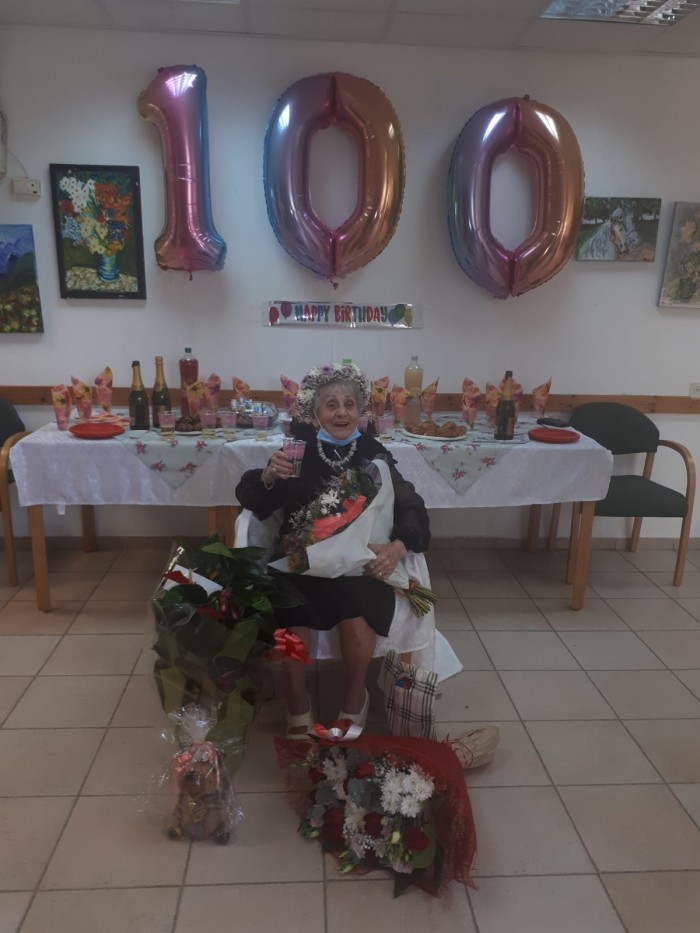Taia Kaplan
Taia was born in 1920 on the road to Bucharest, in the Romanian town of Fokshan, in her grandmother’s home. It was a small house with a garden and cats and dogs who lived together in harmony.
Her father, Zalman, was an actor and a singer with a baritone voice, a member of the Yiddish theater in Romania.
Maybe that explains the presence of Fabrotti, the songster violinist who lived in Taia’s home for many years and sang for the pleasure of the both of them. Overall, Taia’s love of animals built her shared life with Teituka the gray Persian cat who got her Greek name and was also Taia’s friend in those days.
Her mother was a housewife.
Taia did not have any other siblings. Her family moved to the big city, Bucharest, where Taia grew up and got an education, began studying ballet and quickly showed her a talent for gymnastics.
In parallel with her studies at the Jewish school in Bucharest young Taia trained in the gymnastics studio under the tutelage of Madame Sybil who would support Taia for many years, as I will go on to describe.
In the 1940s the big earthquake in Romania caught Taia in the home of her friend. It was a small apartment building. Her friend lived on one of the top floors. They ran down the stairway and out the building.
There was great damage in the region. “It was awful,” Taia relates. Many people were killed. Luckily, none of her family members, friends or acquaintances were killed.
The years went by. Taia grew up and became a member of the Maccabi Organization, where she also trained and sang. She participated in the social activities and was exposed to socialist ideas and the communist way of thinking, this in parallel with her work with Madam Sybil as an assistant coach.
Because of her communist tendencies, before the outbreak of World War Two Taia was sentenced to ten years in prison along with a group of women who had similar political views. Madam Sybil’s testimony in her behalf, in which she vouched for her good character, didn’t help. The sentence went into effect.
During the war, when the Russians entered Romania Taia and her group were freed from prison after four and a half years of imprisonment.
In the meantime, her parents were expelled from Bucharest. Her mother moved through Serbia to Tashkent in Uzbekistan, where she was sent by the Red Army. Her father Zalman was drafted by the Red Army and assigned to guard a military clothing warehouse in the town of Moldevsky in Serbia. Eventually, the whole area became a part of Russia. Alongside the clothing warehouse, Taiai’s father was assaulted and killed by a foreigner. He was forty years old at the time of his death.
After the war, Taia went to the Russian Embassy in Romania and asked them to approve her mother’s return to Bucharest. It took a long time until the longed for visa was granted. Her mother, who was already sick with diabetes, got on a train from Tashkent to Bucharest. She passed away on the journey.
Sybil renewed her relationship with Madam Sybil after the war. Madam Sybil, a Catholic woman married to a Jewish journalist, hired Taia for work in her gymnastic school. Taia worked as Madam Sybil’s right hand, assistant and trainer. She went on to work as a gymnastics teacher in a Romanian high school for many years to come.
With the passage of time, Taia got married and gave birth to three children, twin daughters Victoria and Anna and a son, Pavel. In the 1970s the family immigrated to Israel.
The daughters saw their move to Israel as a stop on the way to the American continent, and settled in Toronto, Canada. Pavel successfully integrated in Israel and worked for many years as an engineer. Taia chose to remain with Pavel in Israel.
In the 1990s Taia moved to the Amigour's Sheltered Home in Kiryat Motzkin. Taia’s modest apartment is full of life and light, just like her.
The walls are adorned with her art work: a depiction of gymnasts working out on the seashore on silk cloth, made by Taia in the 90s. A detailing of Van Gough in oil paint etc. Many pictures from her youth adorn the club. Some of the pictures were given to family members in Israel and overseas.
Together with her in the apartment are pictures of Fabrotti, the violinist and Teituka the Persian cat, as afore-mentioned, along with pictures of horses. She is in constant contact with her children, grandchildren and great grandchildren, who live in Israel and Canada.
Taia speaks Hebrew clearly, rises with relative ease from her cozy easy chair, and runs off in her gym shoes to show me another album and another photo. She wears silver jewelry and without a doubt lives her life with liveliness and intensity.
Who would have believed that this week, little Taia celebrated her one hundredth birthday in August 2020privately, scrolled in the content of her life story over a full period.
The War Period
- Taia was with her grandmother in Bucharest. Her parents were already gone.
In April 1940, security personnel and Romanian regime officials, supporters of Germany, came at night, took me to prison and beat me.
After one week in prison, they transferred us to a larger hall, Corte Marciella, where we awaited our trial.
Over four and a half years in prison, they moved us from place to place a number of times.
In the beginning, we were fifty girls together. Later they transferred us to a place where we were two in a very small cell. Then they transferred us to Missieh, a cold, snowy oil-rich region, where once again we were all together.
The guards were German. In the beginning, we worked at piling up snow, which they would bring to an unknown destination. It was a very difficult winter and we were very cold.
Afterwards, we became friendly with the woman who ran the prison. We got her consent to open a workshop, where we sewed, knitted and did embroidery work. A small percentage of the money stayed with us and most of it went to the administration.
The wives of German and Romanian officers and supporters of the German regime would come to us and we would sew suits for them, knit sweaters for them, give them whatever they wanted.
It was an arrangement where everyone was happy. We were no longer working in the snow, our living conditions were better, the administration enjoyed the money we made for them and the wives of the officers gained from our work.
We taught our friends who didn’t have a profession how to sew and embroider. I was in the knitting group.
The prison also had real criminals. If they had clashes, they would kill freely. We were more cultured, more educated.
- What did you eat?
-Mainly Chorba soup without anything, and mamliga (corn meal mush).
There was a certain group of Communists who were given permission to support us: family members would transfer money to the organization, through which we would also receive food from the outside. It as a legal organization that helped us through the war.
When the Russians entered Romania, it was an exceptional day. They opened the prison. We walked to the train station in the nearest city. There were many prisoners there who had been freed and were also looking for trains to get back to Russia.
At night our train arrived in Bucharest. A lawyer greeted us and explained to us how we can get organized. From there we walked to a Communist Party club where a table laid out with good things awaited us.
In the morning I went to my mother’s family who remained in Bucharest, and I started searching for my mother...





